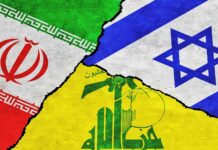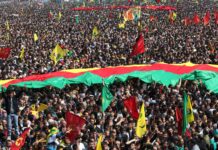
|
Getting your Trinity Audio player ready...
|
By refusing to hold Hamas accountable, Western observers perpetuate despair for Palestinians and Israelis | an article by Avi Melamed published in The Jewish News Syndicate | December 17, 2024.
Even after Oct. 7, many continue to absolve Hamas of its responsibilities, romanticizing the group as “freedom fighters” or a “resistance movement.”
Estimated reading time: 6 minutes
For the past four months, I have crisscrossed North America, speaking to audiences on college campuses and in community centers as part of Inside the Middle East’s “On the Road” 360 tour. One of the most striking patterns I’ve encountered is how little people truly understand the reality in Gaza. This gap in understanding extends beyond the current war with Israel, initiated by Hamas on Oct. 7, 2023, which has left Gaza in ruins. More fundamentally, it reflects a profound failure to recognize that Hamas, as the governing authority in Gaza, holds ultimate responsibility for the dire conditions confronting its own people.
If we are to understand the plight of the Gaza Strip and chart a path towards a more hopeful future for both Israelis and Palestinians, we must face certain truths. While broader regional factors shape Gaza’s circumstances, Hamas bears direct responsibility for its suffering. The chronic hardships endured by some 2 million residents are rooted in years of failed Hamas governance. Hamas must be held accountable for the situation because it has been the government in Gaza since 2007.
In 2005, Israel made the difficult decision to withdraw from Gaza unilaterally. As part of the Disengagement Plan, Israel evacuated thousands of Israeli civilians, dismantled 21 settlements and transferred control to the Palestinian Authority.
This was a moment of opportunity.
Yet, by 2007, Hamas seized power in a violent coup, ousting the P.A. and establishing itself as Gaza’s de facto ruler. Since that moment, Hamas has controlled every facet of life in Gaza—from taxation and education to policing and public services.
In pursuit of its own radical agenda, Hamas transformed the Gaza Strip into a fortified terror stronghold. Billions of dollars in international aid intended to relieve Gaza’s suffering were diverted into constructing tunnels, stockpiling weapons and perpetually preparing for war—at the cost of the very people it rules and claims to represent. Instead of building a better life for Gazans, it enforced extremism, casting its own citizens as pawns and human shields and dragging Gaza deeper into a grim existence and a future stripped of hope.
Hamas’s leadership has mastered the art of deflection, perpetually blaming everyone but themselves for Gaza’s dire situation.
In October 2023, senior Hamas official Moussa Abu Marzouk, speaking in Arabic to an Egyptian interviewer—an interview that received extensive coverage throughout the Arab world, placed responsibility for Gaza’s suffering on everyone other than Hamas—the United Nations, Israel and the international community. Pressed by the Egyptian interviewer on Hamas’s failure to protect civilians, Abu Marzouk unabashedly admitted: “We built the tunnels because we have no other way of protecting ourselves from being killed in airstrikes. We are fighting from inside the tunnels.” Without equivocation, Abu Marzouk reiterated: “Hamas is not responsible for the people of Gaza. The world is responsible for the people of Gaza.”
This interview exposed Hamas’s twisted priorities. Tunnels for militants, not shelters for families.
This indifference was compounded in October when Khaled Mashaal, the billionaire chief of Hamas’s Diaspora Office, spoke abroad from his comfortable life in Qatar. Mashaal referred to the death of Palestinian civilians following the war Hamas provoked as mere “tactical losses,” and “death and destruction for the sake of Allah.”
This strategy of deflection and distortion has been alarmingly effective in certain Western circles. By presenting itself as a resistance movement, Hamas obscures its role in perpetuating human suffering and avoids accountability. Some Western observers—failing to hold Hamas to the standards expected of any governing authority—inadvertently enable Hamas’s destructive behavior. By treating Hamas as heroic freedom fighters, they overlook its oppression of Palestinians, its use of Gaza’s civilian population as a weapon and the sabotage of any path to peace.
Shockingly, even after Oct. 7, some Western observers continue to absolve Hamas of its responsibilities, continuing to romanticize the group as “freedom fighters” or a “resistance movement.”
In stark contrast, within the Arab world and the Palestinian community, there are growing voices calling out the terror organization for its failures and responsibility. P.A. chief Mahmoud Abbas condemned Hamas for the Oct. 7 attacks, calling them a nakba (“catastrophe”) worse than the 1948 events (the founding of modern-day Israel). In early November, Salman al-Dayah, a former dean at Gaza’s Islamic University (a Hamas-affiliated institution) and a leading Islamic scholar from Gaza, criticized Hamas for its violation of Islamic principles during the conflict. Al-Dayah argued that Hamas’s actions had led to widespread civilian casualties, violating the Quranic principles of protecting non-combatants in warfare.
The international community, particularly the West, must follow this lead. For too long, Western policymakers, activists and intellectuals have insulated Hamas from accountability. Those in the West who believe that sparing Hamas from responsibility somehow benefits Palestinians are mistaken. By allowing Hamas to repeatedly instigate conflict—inflicting death and devastation on both Gazans and Israelis without consequence—why would it ever chart a different course?
By holding Hamas to account, the international community can amplify and empower the voices of Palestinians and Arabs who reject its oppressive rule and long for a brighter future.
Holding Hamas accountable is not an anti-Palestinian stance; it is a prerequisite for ending the cycle of violence and must be part and parcel of the conversation. Without it, hope for a peaceful Palestinian state living alongside Israel remains a distant dream.
Avi Melamed is a former Israeli intelligence official who went on to serve as deputy and then as senior Arab affairs adviser to Jerusalem Mayors Teddy Kollek and Ehud Olmert, operating as a negotiator during the first and second intifadas. He is the author of “Inside The Middle East — Entering A New Era,” and his latest docuseries, “The Seam Line,” available on the Izzy streaming platform, focuses on Jerusalem’s flashpoints and his work during the intifadas.
By refusing to hold Hamas accountable, Western observers perpetuate despair for Palestinians and Israelis | an article by Avi Melamed published in The Jewish News Syndicate | December, 17 2024.
If you want to have a better understanding of the news and what really drives the unfolding events…
Read the latest book of Avi Melamed,
INSIDE THE MIDDLE EAST | ENTERING A NEW ERA, available now >>>

Follow me on Twitter @AviMelamed; Facebook @InsideTheMiddleEast; for more Videos on YouTube https://www.youtube.com/c/AviMelamed
I can always be reached at Av*@********ed.com


